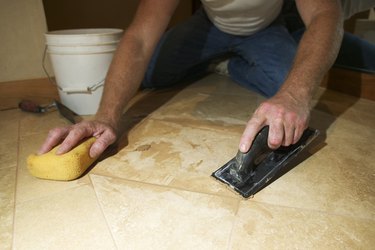Things You'll Need
Screwgun
Galvanized screws
Sealing primer
Floor paint roller
Snapline
Thinset mortar
Tiles
Tile cutter
Grout
Grout float
Sponge

Floor tiles usually should be laid over a strong underlayment of cement board or treated plywood. Still, you may need to tile directly over an existing hardwood floor, for instance to avoid raising the floor level significantly relative to an adjacent floor. If so, make sure the floor is solid and well sealed.
Step 1
Walk over the floor section by section, looking for any sign of movement. Wherever there is movement, sink a galvanized screw, using your screwgun. Make sure to sink the head of the screw beneath the surface of the wood. Continue until there is no movement when you walk across the floor.
Video of the Day
Step 2
Paint the whole floor with sealing primer using your floor roller, starting in the corner of the floor furthest from the doorway and working your way out (so you don't paint yourself in). Let the primer dry for at least 48 hours.
Step 3
Measure the room. Snap a chalkline across the exact center of the floor in both directions, from wall to wall, cutting the floor into four even sections.
Step 4
Spread thinset mortar over about four square feet at the center of the room, where the lines intersect (you should still be able to see them through the mortar). Press your first tiles into place at the intersection, using the lines as guides. Space them consistently (1/8 to 1/4 inch is standard).
Step 5
Lay the rest of the tiles from the center, building toward the walls, along the lines and then outward, spreading more mortar as needed. Space the tiles as desired (1/8 inch to 1/4 inch is standard). Cut the tiles as necessary on your tile cutter for the edges of the room, by the walls. Let the tiles set overnight.
Step 6
Spread grout onto the floor with a grout trowel. Working in sections of five or six square feet, press grout into the spaces between the tiles while squeezing it off the surface. For each section, let it sit for 10 minutes. Wipe it all down with a damp sponge to take up the excess grout. Allow the grout to cure for two days before using the floor.
Tip
Don't lay tiles directly over wood in a bathroom under any circumstances, as moisture can soften the wood and crack the tiles.
Warning
Wear eye protection when cutting your tiles.
Video of the Day